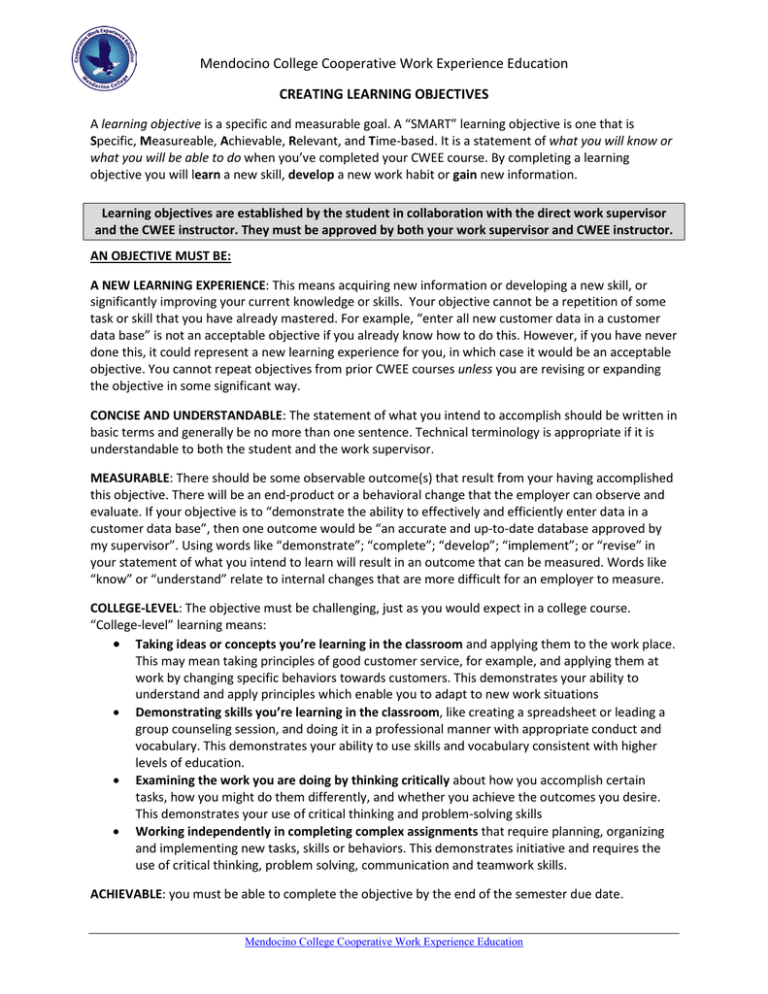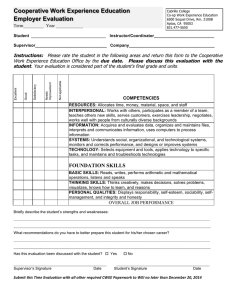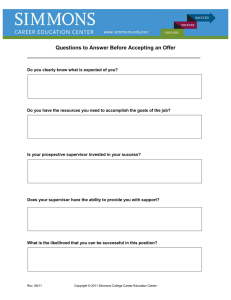Learning Objectives
advertisement

Mendocino College Cooperative Work Experience Education CREATING LEARNING OBJECTIVES A learning objective is a specific and measurable goal. A “SMART” learning objective is one that is Specific, Measureable, Achievable, Relevant, and Time-based. It is a statement of what you will know or what you will be able to do when you’ve completed your CWEE course. By completing a learning objective you will learn a new skill, develop a new work habit or gain new information. Learning objectives are established by the student in collaboration with the direct work supervisor and the CWEE instructor. They must be approved by both your work supervisor and CWEE instructor. AN OBJECTIVE MUST BE: A NEW LEARNING EXPERIENCE: This means acquiring new information or developing a new skill, or significantly improving your current knowledge or skills. Your objective cannot be a repetition of some task or skill that you have already mastered. For example, “enter all new customer data in a customer data base” is not an acceptable objective if you already know how to do this. However, if you have never done this, it could represent a new learning experience for you, in which case it would be an acceptable objective. You cannot repeat objectives from prior CWEE courses unless you are revising or expanding the objective in some significant way. CONCISE AND UNDERSTANDABLE: The statement of what you intend to accomplish should be written in basic terms and generally be no more than one sentence. Technical terminology is appropriate if it is understandable to both the student and the work supervisor. MEASURABLE: There should be some observable outcome(s) that result from your having accomplished this objective. There will be an end-product or a behavioral change that the employer can observe and evaluate. If your objective is to “demonstrate the ability to effectively and efficiently enter data in a customer data base”, then one outcome would be “an accurate and up-to-date database approved by my supervisor”. Using words like “demonstrate”; “complete”; “develop”; “implement”; or “revise” in your statement of what you intend to learn will result in an outcome that can be measured. Words like “know” or “understand” relate to internal changes that are more difficult for an employer to measure. COLLEGE-LEVEL: The objective must be challenging, just as you would expect in a college course. “College-level” learning means: • Taking ideas or concepts you’re learning in the classroom and applying them to the work place. This may mean taking principles of good customer service, for example, and applying them at work by changing specific behaviors towards customers. This demonstrates your ability to understand and apply principles which enable you to adapt to new work situations • Demonstrating skills you’re learning in the classroom, like creating a spreadsheet or leading a group counseling session, and doing it in a professional manner with appropriate conduct and vocabulary. This demonstrates your ability to use skills and vocabulary consistent with higher levels of education. • Examining the work you are doing by thinking critically about how you accomplish certain tasks, how you might do them differently, and whether you achieve the outcomes you desire. This demonstrates your use of critical thinking and problem-solving skills • Working independently in completing complex assignments that require planning, organizing and implementing new tasks, skills or behaviors. This demonstrates initiative and requires the use of critical thinking, problem solving, communication and teamwork skills. ACHIEVABLE: you must be able to complete the objective by the end of the semester due date. Mendocino College Cooperative Work Experience Education WRITING YOUR OBJECTIVE For each objective, you must answer the following questions: 1. 2. 3. 4. What are you attempting to learn? How will the results of this learning be measured? What will the measurable outcomes be? What is the specific learning process you will take to accomplish this objective? When will the objective be completed? WHAT ARE YOU ATTEMPTING TO LEARN? What is your objective? What new knowledge or skill do you wish to learn, or in what ways do you want to improve? Start with words like “I will learn...” or “I will improve…” Use action words (see list below) Example: My objective is to improve my ability to accurately and efficiently review and approve invoices HOW WILL THE RESULTS OF THIS LEARNING EXPERIENCE BE MEASURED? What are some observable outcomes that will result from your having accomplished this learning objective? What end-product or behavioral change will the employer be able to observe and evaluate? What will be the “proof” you accomplished what you set out to do? If the objective is a behavioral one, e.g., “to improve customer service skills”, then evidence of attainment can be based on your supervisor’s and coworkers’ observations of your demonstration of specific new behaviors. Use words from the measurement words list (below). Example: My supervisor will observe that all invoices are accurately sorted, coded and priced, on time and according to her standards WHAT WILL BE YOUR LEARNING PROCESS TO ACCOMPLISH THIS OBJECTIVE? What are the specific learning steps involved in attaining the objective? There must be a clearly defined and outlined “college level” learning process. You should indicate the ways in which you will conduct research, ask questions, receive instructions, be provided with demonstrations, observe others, etc. The following four steps define a typical learning process: 1. Obtain information (read an operator’s manual, read an online tutorial, watch a video, attend a training session or workshop); 2. Observe an experienced co-worker or supervisor demonstrate the skill, or review examples of properly completed work; 3. Be observed by an experienced co-worker or supervisor and receive direction, correction and feedback. Or, have your supervisor review your work and provide you with instructional feedback. 4. Practice, with observation, review and feedback as needed. Use words describing a learning process from list, below Example: • Observe supervisor reviewing invoices; take notes on the procedure and critical things to look for • Review invoices under observation of supervisor; receiving feedback and making adjustments as needed. • Research individual invoices, match invoice amount to previously agree pricing, properly code to expense and adjust invoices if necessary • Continue to seek supervisor’s review and feedback WHEN WILL THE OBJECTIVE BE COMPLETED? All objectives must be completed by or before the Friday before finals week (see your Assignment Tracking worksheet for the exact date Mendocino College Cooperative Work Experience Education ACTION WORD LIST Activate Adjust Aid Analyze Apply Arrange Articulate Assemble Assist Build Calculate Categorize Change Check Collect Combine Communicate Compare Compile Complete Compose Compute Conduct Construct Contrast Convert Coordinate Create Decrease Define Deliver Demonstrate Describe Design Detect Develop Direct Display Devise Edit Establish Estimate Evaluate Expand Explain Gain Identify Illustrate Implement Improve Increase Indicate Inspect Institute Instruct Insert Introduce Investigate Learn Lengthen Limit List Locate Maintain Match Modify Monitor Motivate Obtain Perform Permit Place Plan Process Produce Provide Prepare Rearrange Record Recruit Reduce Remove Repair Replace Report Reproduce Research Restructure Review Revise Rewrite Select Separate Set up Simplify Summarize Supervise Train Translate Transfer Update Verbalize Verify Write MEASUREMENT OF ATTAINMENT WORDS Accuracy Client/customer feedback Company evaluations Comparisons Co-worker feedback Control process Critique Cross-checking Drills Inventory checks Invoices Reductions Review Meeting standards Improved performance Increased accuracy Increased efficiency Increased safety Observation Participants’ review Program review Progress report Quizzing Sale receipts Surveying Testing Verification Mendocino College Cooperative Work Experience Education WORDS DESCRIBING A LEARNING PROCESS Adapting classroom knowledge Analyzing Applying new/current skills Asking Assisting Attending meeting/workshops Consulting Customer response Demonstration Experiencing Following policies & procedures Gathering information Investigating Observing One-to-group sessions One-to-one session On-the job training Operating Organizing information Participation planning Practicing Reading Increased communication Increased product knowledge Researching Reviewing Obtaining feedback Interpreting Receiving Recording Seeking information Seeking input Studying Surveying Using a journal or report Training Trial and error Updating Visitations Using necessary materials Working with co-workers Mendocino College Cooperative Work Experience Education

